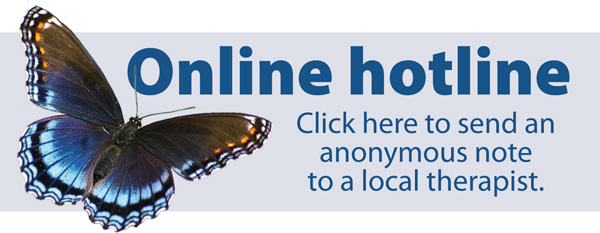
The recent news coverage of celebrity suicides has me worried about one of my friends. We’ve known each other since childhood, and she has always struggled with dark moods, although I don’t know if she has been diagnosed with depression. We don’t live in the same town anymore but I try to call her at least once a week and text often. She gets upset with me if I can’t stay on the phone for long periods of time or if she thinks I haven’t texted her enough. It often feels manipulative or controlling. But lately she has been mentioning these high-profile suicides, and I’m not sure what to do. I’ve read a few articles that say suicide news can trigger other people to do it. I don’t want to miss any red flags, and I truly want to help her. But I don’t feel qualified and I feel like I’m ignoring some of my own family’s needs so I can spend more time communicating with her and trying to make sure she’s okay. I feel stuck. What should I do?
Response by Kim Bond and Whitney Gates of Ozark Guidance
Your questions and concerns are very timely, so thank you for writing. The news of recent celebrity suicides has a lot of us considering our friends and family members who have struggled with this in the past. We commend you for being a caring and concerned friend and understand your being fearful of missing “red flags.”
According to the American Foundation for Suicide Prevention, some warning signs of a person who might be considering suicide include:
 a) if a person talks about killing themselves, feeling hopeless or being trapped, being a burden, or having no reason to live;
a) if a person talks about killing themselves, feeling hopeless or being trapped, being a burden, or having no reason to live;
b) noticeable behavior changes that include: increased drug or alcohol use, withdrawing/isolation, change in sleeping patterns, giving away possessions, saying goodbye to friends and family;
c) changes in mood including: depression, anxiety, irritability, shame, anger or sudden, unexplained improvement in mood. While these are common warning signs, it’s important to remember that this list is not all inclusive and not everyone follows the same pattern.
For your situation, one thing to keep in mind is that the roles and boundaries of therapist and friend are very different. While your friend is lucky to have you, it sounds like your friend could use the support of a trained mental health professional to evaluate what professional care she may need. With this resource in place, you are free to once again be a supportive friend while setting some boundaries around the amount of time you spend with her.
 Oftentimes, people are resistant to beginning mental health treatment due to lack of understanding or fear of stigma; however, it may be appropriate at this time for you to gently share with her that you are concerned for her safety and don’t feel your distance, time restraints, or expertise allow you to give her the help she needs.
Oftentimes, people are resistant to beginning mental health treatment due to lack of understanding or fear of stigma; however, it may be appropriate at this time for you to gently share with her that you are concerned for her safety and don’t feel your distance, time restraints, or expertise allow you to give her the help she needs.
When you make these suggestions, be positive and encouraging, letting her know that you want her safe and healthy for years to come. Remind her of other people in her life that also want her safe and healthy and will support her in her journey. In any event, she needs the assistance of a licensed mental health clinician to assist her in coping with these issues in a safe manner.
You might also find it helpful to reach out to a mental health professional to get support for yourself as often times the support system of someone in crisis experiences negative symptoms themselves and benefits from seeing a counselor.
In the Benton, Carroll, Madison, and Washington Counties, Ozark Guidance is the local community mental health center and can be reached at 479-750-2020. This number also serves as our 24/7 crisis line for both clients and non-clients. For people who do not live in those counties, the National Suicide Hotline number is: 1-800-273-8255.
Therapists at Ozark Guidance would be happy to answer your questions and read what’s on your mind. Click here to read more questions and answers in the On Your Mind category. Click the butterfly icon below to fill out an anonymous submission form with your question or concern. The form contains NO identifying information and is designed to give local women an online place to share concerns with a person qualified to offer feedback.
 Disclaimer: This RESPONSE does not provide medical advice It is intended for informational purposes only. It is not a substitute for professional medical advice, diagnosis or treatment. Never ignore professional medical advice in seeking treatment because of something you have read on nwaMotherlode or Ozark Guidance websites.
Disclaimer: This RESPONSE does not provide medical advice It is intended for informational purposes only. It is not a substitute for professional medical advice, diagnosis or treatment. Never ignore professional medical advice in seeking treatment because of something you have read on nwaMotherlode or Ozark Guidance websites.
